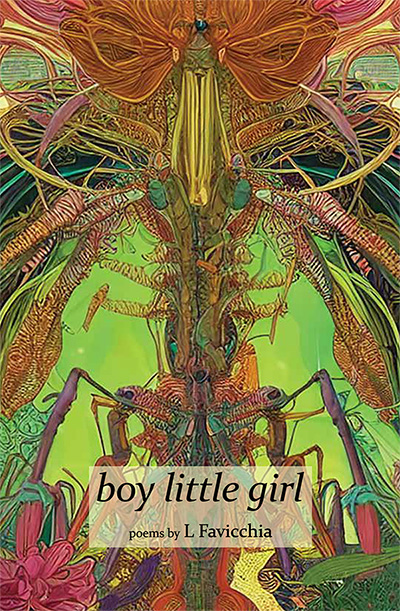boy little girl
poetry by
L Favicchia
~96 pages, $15 (+ shipping)
Release Date: June 9, 2023
The Advance Sale Discount price on this title is no longer available. For those who prefer to pay by check, price is $19/book (which includes shipping) and should be sent to: Main Street Rag, PO BOX 690100, Charlotte, NC 28227-7001.
 L Favicchia is a poet, writer, and teacher living in Kansas where they are finishing their PhD in creative writing. They have been nominated for Best of the Net and Best New Poets and were a finalist in the 2018 Ryan R. Gibbs Award for Flash Fiction and the 2021 Meridian Editor’s Prize in Poetry and Prose. Their work has been published in many literary journals, including Post Road, Permafrost, The Normal School, Okay Donkey, and Glass: A Journal of Poetry. Additional information and publications can be found at lfavicchia.com.
L Favicchia is a poet, writer, and teacher living in Kansas where they are finishing their PhD in creative writing. They have been nominated for Best of the Net and Best New Poets and were a finalist in the 2018 Ryan R. Gibbs Award for Flash Fiction and the 2021 Meridian Editor’s Prize in Poetry and Prose. Their work has been published in many literary journals, including Post Road, Permafrost, The Normal School, Okay Donkey, and Glass: A Journal of Poetry. Additional information and publications can be found at lfavicchia.com.
The poems in boy little girl show that even when beings die, they remain. Favicchia accomplishes something that is both captivating and heartbreaking with these intricate poems; they ask readers why it needs to hurt so much when we are described beyond the naked eye. I think they tell us that the fullness of the world hitting us back will always be worth it for the people we become. ~Ginger Ko
boy little girl, is an imaginative act of rebirth and rebodying, a studied disappearing from the always emergency of a troubled home into wonder for and of the more-than-human world. The poems form an interspecies coming-of-age story where fear and longing collide with curiosity and care for the tender monsters of the wetlands and of the chronically ill body. Childhood explorations in a drained swamp become teachers, countering learned familial violence toward othered bodies and beings. ~Megan Kaminski
The speaker of boy little girl digs into beetle-packed soil, frog-strewn marsh, the split gills of memory, and the animal body. Is there anything more simultaneously mysterious and intimate than one’s own interior, submerged and untouchable? Through a scrim of blood, moss, and curiosity, our speaker finds themselves an inside-outer in a world full of right-side-outs, and wonders aloud if, here on earth, “it’s best […] to try to appear more orchid than exoskeleton.” ~Danielle Pafunda, Author of Spite
The Orchid Mantis’s Body is Not Straightforward
It’s best to be born pink, to shake
while you walk, to braid everything,
to try to appear more orchid
than exoskeleton. It’s best to be born
small enough to wade
through tall, light grasses
of arm hair. If you will more pink
into your capillaries and nibble tupelo,
lick it from where you’ve stepped, it’s easier
to pretend you don’t have sickle feet,
though you must still try
not to split your tongue.
A menagerie of small insects
may eventually quiet your fear of holes,
no longer plunging into yourself
to return with shoulders no sharper.
You scare your neighbors
by standing perfectly still—
you were born pink
but didn’t stay that way,
you were born small
and still are.
The Females of Some Species Are Larger
My instinct is not to bite.
Instead I’ll show you all
my little square teeth,
point them out to you
one by one name them
then leave my mouth open
and breathe.
Enamel speaks a thing you can’t
understand—the grain of sand
churning in the oyster
who layers thick saliva
over and over until pearl
to numb the gnawing and is still
left with a tender lump inside—
one she is torn apart for.
Why isn’t the female larger
and more colorful? Give me the terrified
red veins of the albino raven,
the deep flush and large forearms
of the orchid mantis, also afraid.
Let me have fiery long hair that stings
with the smell of burning oak.
When I skin myself, I skin myself
in front of a mirror to see
all that pretty muscle.
I rehearse what crying looks like,
in my wardrobe keep buttons
that close soft bobbled sweaters
and feel an increasing desire
to become mud, to lie
beneath leaf litter and hide
from grabbing hands
that would put themselves inside me,
playing dead to save myself
from the salt of their fingertips
that craves a wound.
(i have nothing to offer)
i. my grandmother’s cookbook
there needs to be more
oregano. oregano
in everything, blood
oregano. oregano blood.
pickled turnips
are a red meal
like blood matted
in the damp hay of her hair
and your fingerprints
stained pink from beets,
the artificial color you wash away
in handfuls of untamed duckweed.
ii. my grandmother’s cookbook
i have ash on my legs,
my legs that have too many ankles.
i hold a tissue paper body
as long as i can,
or until i must exhale.
she was beautiful
and then she died
and was still beautiful.
have you ever excused yourself
to an empty room
just to whisper oregano?
Self-Portrait as a Glass Doll
After Anne Sexton and Nancy Reddy
Snow White was ten and knew something
was wrong, pale-faced and glass-eyed
as her companions tried to stir her.
She was bleeding inside
and out of season. There is no evil
stepmother, but doctors
said she sought ruby-lipped attention. She pretended
she was asleep when her father came
to mock her for growing
breasts. She shut her eyes tightly
wishing away the glass dome
as darkly as her own insides.
She was on Depo Lupron—
a drug not meant for anyone
under eighteen, made to induce menopause
in patients much older than her,
the crone, the witch, she became
her own daughter ouroborosed.
She vomited into bushes
as black tissue blotted stray organs,
mistaking them for infants
meant to be swaddled, very confused uterus
blooming inside with endometrium,
the too-comforting terrarium of her gut.
She thinks her doctor was disappointed
to find the little tufts,
her confettied bladder and intestines,
and so took her hymen,
cut it roughly away while she slept,
body never safe
from gloved hands. Daily she wakes
back into gender, no prince
but salted fingertips
dipping themselves inside
her glass-domed body
always surprised to find a tight bundle
of scar tissue as they ask her, sleepless,
if she knew these practices
were antiquated and barbaric.


 L Favicchia is a poet, writer, and teacher living in Kansas where they are finishing their PhD in creative writing. They have been nominated for Best of the Net and Best New Poets and were a finalist in the 2018 Ryan R. Gibbs Award for Flash Fiction and the 2021 Meridian Editor’s Prize in Poetry and Prose. Their work has been published in many literary journals, including Post Road, Permafrost, The Normal School, Okay Donkey, and Glass: A Journal of Poetry. Additional information and publications can be found at lfavicchia.com.
L Favicchia is a poet, writer, and teacher living in Kansas where they are finishing their PhD in creative writing. They have been nominated for Best of the Net and Best New Poets and were a finalist in the 2018 Ryan R. Gibbs Award for Flash Fiction and the 2021 Meridian Editor’s Prize in Poetry and Prose. Their work has been published in many literary journals, including Post Road, Permafrost, The Normal School, Okay Donkey, and Glass: A Journal of Poetry. Additional information and publications can be found at lfavicchia.com.